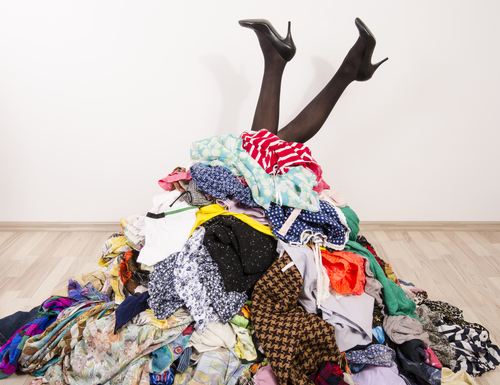Too Much Stuff Has a Huge Effect on You
At work, it is clutter has a negative effect on productivity. Similarly, too much stuff at home can be detrimental to your physical and mental heath.
Have you accumulated more “stuff” in your home than you’d like to talk about? If you answer “yes,” you’ve got lots of company. Clutter, stuffed closets, and unusable garages were discussed recently on national television. Currently, it is a national problem. Nowhere else, do people spend so much money to store their “stuff” in storage facilities.
Clutter isn’t a new problem. Over two decades ago, the comedian, George Carlin helped us laugh about our “stuff.”
Why do we collect too much stuff? Here’s what people say:
- “Maybe I’ll need it someday.”
- “It has sentimental value.”
- “I’m stressed and tired and have no motivation to tackle extra chores
- “It’s overwhelming to even think about cleaning the garage or basement.”
- “I love to shop and feel great finding clothes or household items. Who says that 50 purses is too much?”
- “I can’t resist those extra-large packages at Costco. I know I don’t need 500 napkins, but…”
The clutter doesn’t stop in our closets, cabinets, or drawers. It is reported, “Almost 1 in 4 Americans say their garage is too cluttered to fit their car. In their survey, although 92% of people describe their home as Very/Somewhat Organized, 30% keep the garage door shut so neighbors don’t see the mess.
The Cost of Clutter
Although you may laugh about the problem, in addition to decreasing productivity, there are a variety of negative effects of too much stuff on mind and body. These include:
- Unnecessary stress.
- Increased fatigue. You never feel things are in order and it saps your energy.
- Wasted time. Some say we waste the equivalent of 1 year of life looking for items.
- Extra costs: It is hard to find bills, but easy to be penalized with late fees and interest. You buy things you already have but forgot about.
- Preventable accidents. Items left on the floor or piled on shelves are the cause of many home accidents.
- Tardiness: You lose time searching for papers or items that are covered with piles of papers or clothes.
- Dissatisfaction and negative mood. You may feel that things are out of hand and will never get better. Your home does not contribute to a positive atmosphere.
- Increased distraction: It is hard to focus on getting things done when you can’t find what you need.
- Deceased creativity. Mess and too much stuff saps your creative juices.
There is no time like the present to begin. Make a small commitment to get rid of some of your stuff. Here are a few tips:
De-Clutter Tips
There is no time like the present to begin. Make a small commitment to get rid of some of your stuff. Here are a few tips:
- Set aside time to de-clutter on a regular basis. How about once a month or once a quarter? For example, when it is time to pay the bills, leave 40 to 50 minutes to de clutter one closet or drawer.
- When you begin to de-clutter, create three categories:
-“I must keep it.”
-“I can donate it. Someone else can use this.”
-“This needs to be thrown out. The item is broken, tattered, or unusable.”
- Work with a friend or buddy
- Find a professional
- Set guidelines. For example, if you haven’t used an item in 2 years, chances are you don’t need it.
Other Resources
Clutter consists of inanimate objects. You are in control. If you want to begin to de clutter or want to increase skills, there are many resources to access. For example,
“The Life-Changing Magic of Tidying Up: the Japanese Art of Decluttering and Organizing” by Marie Kondo;
“Organizing Your Home with SORT and SUCCEED: Five simple steps to stop clutter before it starts, save money and simplify your life” by Darla DeMorrow; and
“Cluttered Mess to Organized Success Workbook: Declutter and Organize your Home and Life” by Cassandra Aarssen – with over 100 Checklists and Worksheets.
There’s never a better or best time to de-clutter and organize. Life will always be busy. But if you take it one step at a time and make it a practice to keep clutter away you’ll experience far less stress and experience far greater productivity, physical and mental health and wellness!
*******************************
If you have tried to clear out the clutter and haven’t been successful, let’s talk. Contact me: geri@managingyourmind.com.
See free resources at my updated website http://www.managingyourmind.com
Get my free app with tips for conquering the 8 demons of distraction at your fingertips (i-phone or android)
Click Here for Great Resources from Dr. Geri Markel
Dr. Markel Offers Leadership and ADHD Coaching
Value-Driven Keynotes and Breakouts.
Book Dr. Markel to Speak at Your Next Event? Connect Today!
Download Dr. Markel’s Speaker One Sheet: GeriMarkelCorporateOneSheet-Print
Speaker one-sheet for universities GeriMarkelAcademicOneSheet-Print







